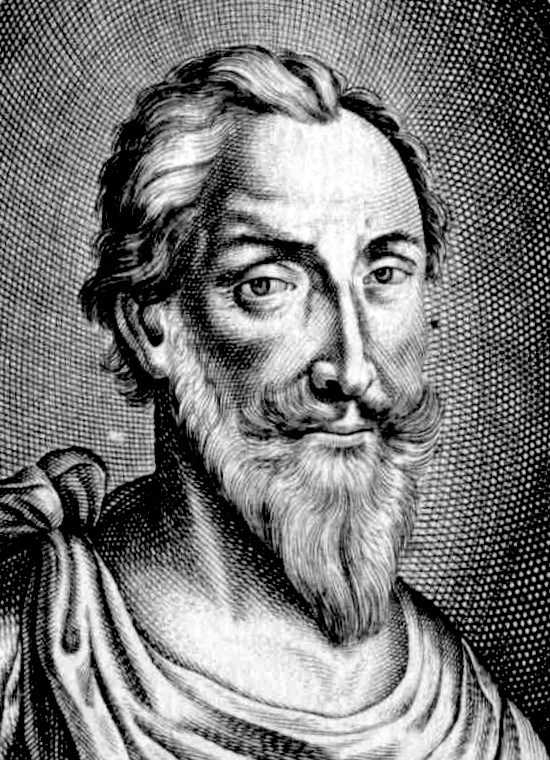Jacques Mauduit
Jacques Mauduit (born September 16, 1557 in Paris , † August 21, 1627 ibid) was a French composer of the late Renaissance . He is considered to be one of the most inventive composers of the late 16th century, who introduced the polychoir of the Venetian School into French music.
Life
Much of the biographical data on Mauduit can be found in the writings of Marin Mersennes . Mauduit was born into a noble family. He received excellent education in the humanities, philosophy and languages, including Italian and Spanish. From his father he took over the office of registrar for petitions at the Paris Palace of Justice. He evidently developed his musical knowledge self-taught. In 1581 he won a prize in the Sainte-Cécile Competition in Évreux for the five-part motet Afferte Domino .
Mauduit was a member of the " Académie de musique et de poésie ", the circle founded by Jean-Antoine de Baïf and Joachim Thibault de Courville to maintain the musique mesurée à l'Antique , d. H. to reawaken the rhetoric and ethics of the music of ancient Greece in contemporary French music and poetry. After Courville's death in 1581, Mauduit became the musical chairman of the Académie. He designed the Cecilia Festival in Notre Dame de Paris and the court ballet under Henry IV and Louis XIII. When Ludwig moved to the capital in 1614, Mauduit conducted the performance of the festival music.
Mauduit has been described as brave. During the siege of Paris (1589/90) at the end of the Huguenot Wars, he helped Claude Le Jeune and himself to escape the city. At risk of his life, he saved a large part of Le Jeune's music and Baïf's unpublished works. Mauduit outlived all of the composers at the Académie. He died in Paris in 1621.
plant
Mauduit was a prolific composer of chansons in the then new style of musique mesurée, which precisely matched the note values to the metrics of the French language. He did not achieve the fame of Claude Le Jeunes. This is also due to the fact that Mersenne promised to publish Mauduit's complete works, but never put his plan into practice. Mauduits composed in a simple and clear style. During the setting he made no changes to the texts. He achieved a varied sound image mainly through harmonic means.
One of his well-known works is a five-part requiem (1585) for the funeral of the poet Pierre de Ronsard . It was performed again on the anniversary of the death of Henry IV in 1611 and was also heard at Mauduit's own funeral. His first printed work was the four-part Chansonnettes mesurées de Jean-Antoine de Baïf (1586). This collection was the first to consist entirely of compositions from the Musique mesurée. Most of his music from the late 16th century is considered lost. Among the lost works, Mersenne named over 300 psalm , several Vespers and tenebrae settings , 104 hymns , masses and motets. This makes Mauduit the one of the important composers of the late Renaissance whose work is least well documented.
Mauduit also emerged as the composer of Airs de Cour for voice and lute . In 1617 he participated alongside Pierre Guédron , Antoine de Boësset and Gabriel Bataille in the joint composition of the ballet La Déliverance de Renaud . He introduced the musique mesurée style into the 16th century and also combined it with genres for which it was not intended, e.g. B. Large vocal-instrumental ensembles in the tradition of the Venetian school. Mersenne credited him with introducing the gamba consort to French music. He also claimed Mauduit suggested adding a sixth string on the viola da gamba.
literature
- Michel Brenet: Jacques Mauduit . In: Musique et musiciens de la vieille France . Alcan: Paris 1911. Reprint Éditions d'Aujourd'hui: Paris 1978. pp. 199–243
- Bénédicte Genestier-Chemin: Jacques Mauduit (1557-1627), l'homme et l'œuvre . (Dissertation) Paris 1989
- Jeanice Brooks: Courtly Song in Late Sixteenth-Century France . Chicago: University of Chicago Press 2000. ISBN 0-226-07587-7
Web links
- Sheet music in the public domain by Jacques Mauduit in the Choral Public Domain Library - ChoralWiki (English)
| personal data | |
|---|---|
| SURNAME | Mauduit, Jacques |
| BRIEF DESCRIPTION | French composer of the late Renaissance and early Baroque periods |
| DATE OF BIRTH | September 16, 1557 |
| PLACE OF BIRTH | Paris |
| DATE OF DEATH | August 21, 1627 |
| Place of death | Paris |
